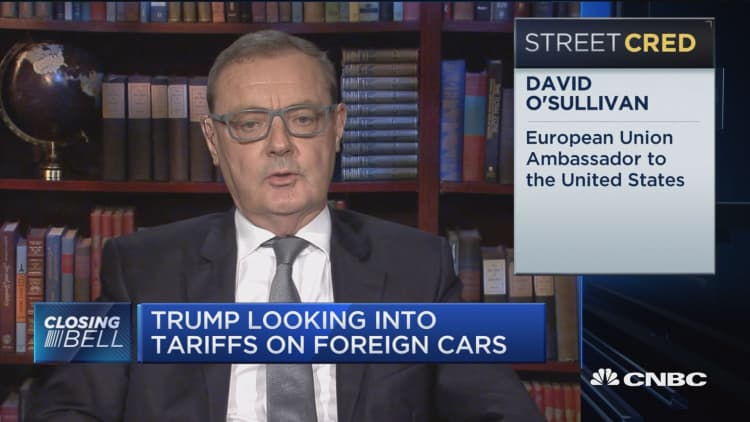European carmakers could see their revenues seriously impacted if President Donald Trump presses ahead with new tariffs, analysts told CNBC.
“New tariffs on EU cars would have a significant impact … The United States is the biggest and highest margin market for them. It could mean a significant 7 to 10 percent hit on 2019 earnings estimates to the main automakers in Europe,” Daniel Lacalle, chief economist at Tressis Gestion, said via email on Wednesday.
The EU is the largest exporter of motor vehicles in the world, whereas the United States is the largest importer of motor vehicles in the world. According to the European statistics office, Eurostat, the U.S. imported cars amounting to 254 billion euros ($296.12 billion) in 2016, while Europe imported only 77 billion euros.
To reduce the U.S.’s trade deficit, Trump has threatened multiple times that there could be new duties applied to European cars. “We are finishing our study of tariffs on cars from the EU in that they have long taken advantage of the U.S.,” Trump said Tuesday, “In the end it will all even out and it won’t take long.”
German growth could be hit
Analysts believe that there is no policy that Europe could implement to offset such an impact. Ricardo Garcia, chief euro zone economist at UBS, said that the industry is looking at a major challenge “in terms of visibility for investments as well as business outlook.”
“For what it's worth, German carmakers are not expecting any increase in exports anymore. We think the economic impact on German GDP (gross domestic product) would be close to 0.2 percent (for 2019) and on the EU less than 0.1 percent,” Garcia added.
Car tariffs are particularly painful for Germany compared to all the other 27 European countries. Germany alone represented 55 percent of the total EU car exports in 2017. Lower profits are not only negative for these firms but also for equity investors, given that it is less likely they will receive dividends. Potential investment from car companies could also be curbed if revenues are hit.
“It’s potentially very damaging for particularly the German auto sector, and there is no specific policy measure that can offset it,” Erik Nielsen, chief economist at UniCredit, told CNBC Wednesday morning.
(The U.S.) have much higher (tariffs), for instance, on trucks, on lorries, they have higher on shoes, on clothing.Cecilia MalmstromEU’s trade chief
Earlier this year, the EU proposed a small investment agreement to the U.S. to reduce tariffs in goods, including cars. But the proposal was taken away when Trump slapped new metal tariffs on the bloc at the start of June.
“It is true we have a slightly higher tariff on cars then the Americans … But they have much higher (tariffs), for instance, on trucks, on lorries, they have higher on shoes, on clothing,” Cecilia Malmstrom, the EU’s trade chief said Wednesday.
She told reporters in Brussels that the EU cannot simply remove the tariff on U.S. cars (10 percent) overnight, because under World Trade Organization (WTO) rules, the EU would have to do the same for every country in the world. “And I don’t think member states are willing to do that,” she added.
Currency impacts
When asked how the EU could offset the impact of car tariffs, Nielsen from Unicredit said that currency markets could help a little. “If we’re to get a major and sustained forex (foreign exchange) move, it would help some,” he added.

Calculations from Bank of America Merrill Lynch showed Monday that if the U.S. dollar were to appreciate 7.5 percent, this could offset the entire impact of U.S. car tariffs. The research assumed that the new duties would increase from the current level of 2.5 percent to 25 percent, as Trump has signaled.
Though such a dollar appreciation is not the baseline scenario of the investment bank, it is one that its says “is not completely unimaginable.” Many expect the greenback to rise on the back of tightening interest rates in the U.S., financial stimulus and the repatriation of funds.
China demand
Nonetheless, others believe that even if the dollar strengthens significantly, it is not going to help with tariffs because the euro is likely to remain strong too. Broadly speaking, the lower a currency is, the higher the appetite to buy goods in that currency given that they will be cheaper.
“The currency could help, but UBS still expects the euro to grind higher to 1.30 (against the dollar) over 12 months,” Garcia from UBS told CNBC. But he added the impact of these car tariffs could be helped by improving Chinese demand.
“A more likely venue might be additional Chinese demand as the country diverts demand to other more reliable trade partners such as the EU,” he said. The U.S. has applied new tariffs to China too.
“To this effect, the Chinese are lowering car tariffs (helping the EU car industry), and the French PMI (purchasing managers’ index) for example already reported higher Chinese demand. More is likely to come,” Garcia said.
Shares of BMW are down 10 percent and Volkwagen’s are off by 24 percent since a Janury peak.



